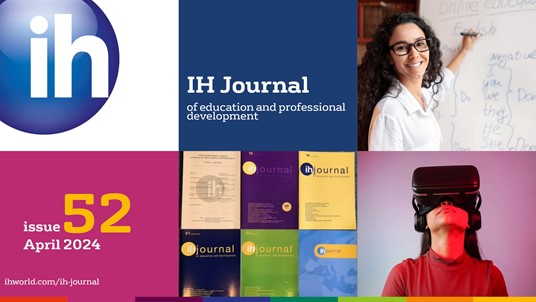Online Teaching - A Personal Perspective
by Shabnam Jafarova
Read MoreHello and welcome to Issue 52 of the International House Journal!

There are many perks to the job of being Editor of the IH Journal. Sure, I get to read everything before anyone else and benefit from the fine ideas that are being sent each month. But I also get to speak to people in the world of EFL that I’ve never spoken to before, and this has led to some fascinating discussions.
Recently, two themes have emerged from what people have been telling me.
The first, on learner autonomy, is the topic of our miniature special feature. Many of my colleagues see themselves as moving away from teaching in the traditional sense, instead adopting different guises like mentor, coach, and guide. They are moving in these directions so that they can create a space in the classroom for their students to move into, because, as my contacts are quick to point out, the learning potential for someone who experiences true autonomy is much greater than for those who prefer to be spoon-fed. We have two articles on this topic: the first, by Julia Ochocinska, takes a high-level view; the second, co-written by Phoebe Gomes and Mike Tomkins, gets us down into the nitty-gritty of actually making learner autonomy happen. Both are well worth a read!
The second theme to come out of my varied discussions was about the future - and specifically my colleagues’ future in EFL. I completed a master’s course a few years back, and I have been recommending the same pathway to many of my peers; it seems a few are now taking up the challenge. But to do a master’s, or to complete the Delta, you need to know how to write academically, and most good academic writing is hidden behind a paywall. Not so in this issue of the Journal, however, as we have some excellent articles in our In Academia section. These will please Academic Managers - Patrick Creed’s piece on Knowledge Management will help to shape school strategy - and those, like me, who have a fondness for well-researched, longer texts; but they will also provide a model for future MA candidates of how good academic writing should look - Daniel Tse provides one example with his look at Backchannelling, while Frank Carrizo Zirit’s article about Multimodality in ELT will spark many writers’ imaginations and research interests!
But the Issue is not just about learner autonomy and academic writing - we have many other pieces that will pay back the time you spend reading them. Hall Houston is here with a practical guide to playing Tic-Tac-Toe in class; Tony Penston will convince you to integrate corpora into your teaching; Pilar Capaul will reinvigorate your use of Google Classroom; and Elly Setterfield can tell us more about social and emotional learning. And that’s just for starters - there are more than twenty pieces in this collection of some of the best writing in EFL, so get reading, and have fun!